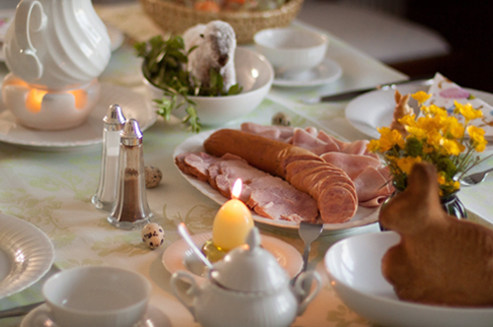Blessed foods and state-of-art egg shells
The beginning of Easter celebrations is always solemn, as it falls on the Good Friday: a holiday commemorating the last moments of Jesus Christ’s earthly life. Poles attend masses, embark on processions, symbolically re-enacting the crucifixion, and above all, restrain from any form of crapulence and gluttony. It is the time for pensiveness and reflection, the joyful feast will commence thereafter, with the atmosphere of festive exhilaration filling the air from the early hours of the Holy Saturday. Although not a public holiday, this day marks the beginning of Polish celebration of Easter. The morning is reserved for the preparations of święconka: a traditional basket, wadded with white lace and filled to its brim with a plethora of food items, from fresh meat to pinches of salt and pepper, each having a symbolic meaning. Eggs stand for life and rebirth, therefore they are treated with particular care: colourful and encrusted with folk patterns, they occupy a place of honour in every basket. Their name, pisanki, refers to the handicraft process involved in their creation, and each region of Poland has different traditional embellishments that are either painted or carved on the dyed shells. Święconka is now ready to earn its name by receiving a blessing in the local parish. This process is a remarkable sight to witness, with tens of decorated baskets displayed on a prodigious table set on a church grounds, and an even larger crowd of people gathering around them. Once the ceremony is over, it is time to put the basket aside: regardless of how appetising the food looks like, it is reserved for the Easter Sunday.
A long breakfast
The time to rejoice begins around noon: families gather for Easter breakfast to feast on the blessed foods and numerous other delicacies, including savoury sausages, a white borscht soup, and sweet Easter cakes and beautifully crafted mazurkas. Some have a tradition of sharing an egg, where they exchange holiday wishes of health and prosperity for the months to come. But while the food may appear tempting after a long period of Lent, it is the time spent together that is cherished the most: this breakfast will last until the evening hours, as families use it to share their happiness with what is likely to be their first gathering this big and this joyful since Christmas. And with the following Monday being another public holiday, they will assemble again to continue their celebrations. However, be wary: regardless of how little sleep you managed to get during the night, you may experience a wet reveille! Easter Monday is also known as a Dyngus Day, and Poles commonly begin it by dousing their loved ones with water – be it with a miniature toy water-gun, or a full-sized bucket. It is a friendly custom, and yet another way of developing even closer relations between families and friends.
A sense of togetherness
To Poles, these ties are precious. They remain unaltered when living abroad, and that is why the celebrations of Easter are just as pompous for Polish communities in the United Kingdom as for their relatives back in Poland. It is also a reason for their appreciation towards numerous other events that allow them to come together – and spring will abound with similar occasions, starting as soon as in two weeks from Easter, with the Days of Poland Festival. The date is non-contingent: the first weekend of May is yet another Polish holiday, the famous majówka. 2017 will be the fourth year that Poles in London are able to celebrate it as they would in their home country: with live music, plethora of traditional food, and a familial outdoor fun!
Read also: Days of Poland – the biggest Polish Festival in London
More information on: Days of Poland Festival
Photo © Days of Polish Festival


